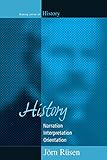History : Narration, Interpretation, Orientation / Jörn Rüsen.
Material type: TextSeries: Making Sense of History ; 5Publisher: New York ; Oxford : Berghahn Books, [2005]Copyright date: ©2005Description: 1 online resource (236 p.)Content type:
TextSeries: Making Sense of History ; 5Publisher: New York ; Oxford : Berghahn Books, [2005]Copyright date: ©2005Description: 1 online resource (236 p.)Content type: - 9781845450496
- 9781782389675
- 907/.2 22/eng
- D16.8
- online - DeGruyter
| Item type | Current library | Call number | URL | Status | Notes | Barcode | |
|---|---|---|---|---|---|---|---|
 eBook
eBook
|
Biblioteca "Angelicum" Pont. Univ. S.Tommaso d'Aquino Nuvola online | online - DeGruyter (Browse shelf(Opens below)) | Online access | Not for loan (Accesso limitato) | Accesso per gli utenti autorizzati / Access for authorized users | (dgr)9781782389675 |
Frontmatter -- Contents -- List of Tables -- List of Figures -- Preface -- Introduction: How to Understand Historical Thinking -- I: NARRATION -- Chapter 1 Historical Narration: Foundation,Types, Reason -- Chapter 2 Narrative Competence: The Ontogeny of Historical and Moral Consciousness -- Chapter 3 Rhetoric and Aesthetics of History: Leopold von Ranke -- Chapter 4 Narrativity and Objectivity in Historical Studies -- II: INTERPRETATION -- Chapter 5 What is Historical Theory? -- Chapter 6 New History: Paradigms of Interpretation -- Chapter 7 Theoretical Approaches to an Intercultural Comparison of Historiography Chapter 8 Loosening the Order of History: Modernity, Postmodernity, Memory -- Chapter 8 Loosening the Order of History: Modernity, Postmodernity, Memory -- III: ORIENTATION -- Chapter 9 Historical Thinking as Trauerarbeit: Burckhardt’s Answer to a Question of our Time -- Chapter 10 Historizing Nazi-Time: Metahistorical Reflections on the Debate Between Friedländer and Broszat -- Chapter 11 Holocaust-Memory and German Identity -- Bibliography -- Index
restricted access online access with authorization star
http://purl.org/coar/access_right/c_16ec
Without denying the importance of the postmodernist approach to the narrative form and rhetorical strategies of historiography, the author, one of Germany's most prominent cultural historians, argues here in favor of reason and methodical rationality in history. He presents a broad variety of aspects, factors and developments of historical thinking from the 18th century to the present, thus continuing, in exemplary fashion, the tradition of critical self-reflection in the humanities and looking at historical studies as an important factor of cultural orientation in practical life.
Mode of access: Internet via World Wide Web.
In English.
Description based on online resource; title from PDF title page (publisher's Web site, viewed 25. Jun 2024)


